Multimedia • Reference • Religion • Travel |
 The Art of Reading Scripture Edited by Ellen F. Davis and Richard B. Hays
Description From The Publisher: The difficulty of interpreting the Bible is felt all over today. Is the Bible still authoritative for the faith and practice of the church? If so, in what way? What practices of reading offer the most appropriate approach to understanding Scripture? The church’s lack of clarity about these issues has hindered its witness and mission, causing it to speak with an uncertain voice to the challenges of our time. This important book is for a twenty-first-century church that seems to have lost the art of reading the Bible attentively and imaginatively. The Art of Reading Scripture is written by a group of eminent scholars and teachers seeking to recover the church’s rich heritage of biblical interpretation in a dramatically changed cultural environment. Asking how best to read the Bible in a postmodern context, the contributors together affirm up front “Nine Theses” that provide substantial guidance for the church. The essays and sermons that follow both amplify and model the approach to Scripture outlined in the Nine Theses. Lucidly conceived, carefully written, and shimmering with fresh insights, The Art of Reading Scripture proposes a far-reaching revolution in how the Bible is taught in theological seminaries and calls pastors and teachers in the church to rethink their practices of using the Bible. Contributors: Gary A. Anderson Reviews This is surely one of the most helpful books on interpreting biblical texts that has come along in a long time. While the authors do not all say the same thing, there is an impressive consistency of interpretive approach that serves to open the Scriptures for the church so that they truly enrich, teach, and illumine the life we live. Postmodernists, historical critics, and theologians here engage in thinking about how to read the Bible in a way that frees it from the captivity of postmodernism, historical criticism, and theology and returns it to the church as its true lifeblood. I especially commend this book to those who are interested in seeing how rich and deep can be a reading of the Bible that is truly done in community. —Patrick D. Miller These distinguished scholars go a long way forward toward recovering an exciting and coherent exegetical agenda for reading the Bible as Sacred Scripture. —Brevard S. Childs With contributions from major figures across the disciplines, this book offers a superb look at the present state of play for a renewed theological interpretation of Scripture. Especially helpful is its attention — critical and not nostalgic — to the church’s earlier history of interpretation and the place that it might have in the late-modern recovery of theological reading. —Christopher Seitz “Theological interpretation,” like a modern-day holy grail, is mentioned often, but claims of actual sightings are both few and exaggerated. Ellen Davis and Richard Hays have given us access to a multidisciplinary conversation concerned with and exemplifying the genuine relocation of the Bible within the church — that is, as authoritative Scripture. The result is a bold, impassioned, open-ended invitation and guide to the craft of reading Scripture. This is must reading for Christian pastors, theological students, exegetes, theologians, and preachers. —Joel B. Green Reader's Index Send us your favorite quotes or passages from this book. About the Editor Ellen F. Davis is associate professor of Bible and practical theology at Duke Divinity School, Durham, North Carolina. Richard B. Hays is George Washington Ivey Professor of New Testament at Duke Divinity School, Durham, North Carolina. Table of Contents
Customer Reviews Write your own online review. Look for Similar Books by Subject | ||||||||
Copyright ©1996-2006 CenturyOne Bookstore. All Rights Reserved. All prices subject to change and given in U.S. dollars. Your purchase from CenturyOne.com will assist the CenturyOne Foundation in providing funding for various archaeological and research projects which seek to provide more information about the period of the First Century C.E., the origins of Christianity and the world of the Bible in general. All materials contained in http://www.centuryone.com are protected by copyright and trademark laws and may not be used for any purpose whatsoever other than private, non-commercial viewing purposes. Derivative works and other unauthorized copying or use of stills, video footage, text or graphics is expressly prohibited. |

